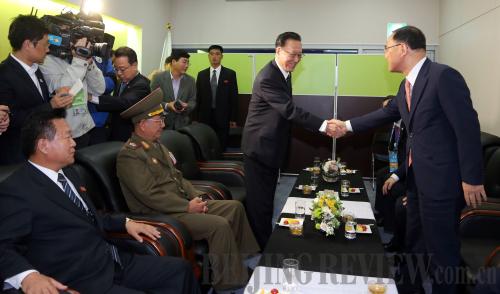|
 |
|
SURPRISE VISIT: South Korean Prime Minister Chung Hong Won (right) meets with a visiting North Korean delegation led by three top officials, namely Hwang Pyong So (second left), Choe Ryong Hae (first left) and Kim Yang Gon in Incheon on October 4 (XINHUA/AFP) |
Jeffrey Fowle, a U.S. detainee in the Democratic People's Republic of Korea (DPRK)—also known as North Korea—was released on October 21.
The 56-year-old Fowle was arrested in North Korea after he left Bible in his hotel room in May. Local authorities accused him of hostile acts against the country. Washington has repeatedly urged Pyongyang to release Fowle and two other U.S. citizens it detained in 2012 and 2014—Kenneth Bae and Mathew Miller.
The U.S. Government welcomed the DPRK's decision to free Fowle, said Department of State spokeswoman Marie Harf following the news.
Observers described the move as a positive signal sent by Pyongyang to Washington. In fact, in the last several months, North Korea appears to have been engaging in a diplomatic offensive. Senior DPRK officials have made frequent foreign visits and attended multilateral meetings.
Diplomatic offensive
On October 4, a DPRK delegation paid a surprise visit to Inchon of the Republic of Korea (ROK), or South Korea, which was hosting the 17th Asian Games.
The delegation was led by three top aides of DPRK leader Kim Jong Un—Hwang Pyong So, Vice Chairman of the DPRK National Defense Commission and Director of the General Political Bureau of the Korean People's Army, as well as Choe Ryong Hae and Kim Yang Gon, secretaries of the Central Committee of the Workers' Party of Korea. This was the highest-level delegation that North Korea had sent to the ROK since Kim Jong Un assumed power in 2012.
During the visit, North and South Koreas agreed to resume high-level talks in late October or early November. The first and only North-South high-level dialogue since ROK President Park Geun Hye took office in late 2012 was held on February 12 at Panmunjom.
South Korea's Ministry of Unification said on October 4 that the visits of North Korean Asian Games athletes and top officials were hopeful to ease tensions and improve relations between the two countries.
In addition, DPRK Foreign Minister Ri Su Yong has made a number of foreign trips following his appointment this April, some of which were rarely conducted by senior North Korean officials.
Most notably, Ri attended the UN General Assembly in New York City and delivered a speech on September 27. The last time that a North Korean foreign minister spoke at a UN General Assembly in New York was 15 years ago. Ri even spoke of human rights in North Korea and noted the unification issue. In the past, the topic of human rights in North Korea was avoided entirely by its diplomats.
During his stay in New York City, Ri met with a number of foreign ministers as well as UN Secretary General Ban Ki-moon. He also attempted to meet with U.S. Secretary of State John Kerry, but the U.S. side declined the request, according to Seoul-based Yonhap News Agency. Nevertheless, Ri's international debut made quite a stir.
Kang Sok Ju, Secretary of the Central Committee of the Workers' Party of Korea, who is charge of the Party's international affairs, also visited Germany, Belgium, Switzerland, Italy and Mongolia in early September. This was Kang's first diplomatic tour since he took office in April.
Wang Junsheng, a research fellow with the Institute of Asia-Pacific Studies under the Chinese Academy of Social Sciences, said that Kim Jong Un may have found that tough foreign policy approaches are unable to reach objectives and decided to pursue talks with the international community.
"But North Korea's active stance in talking with the international community does not mean a fundamental change in its foreign policy. The rare attempts at diplomacy may have many underlying causes," Wang commented.
| 